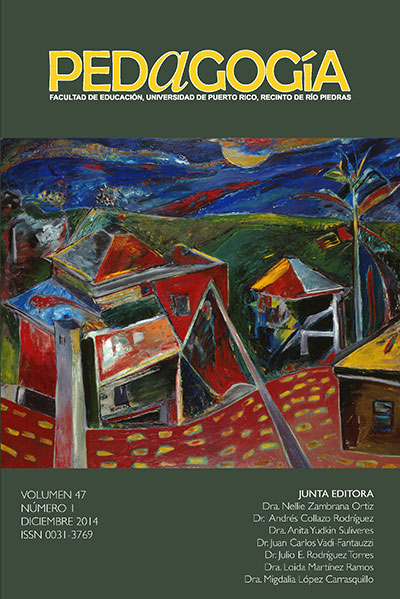Abstract
The constructivist critique usually centers on the comparison between the radical constructivism (RC) of Glasersfeld and the more moderate conception (MC) associated with Piaget. This comparison, while interesting, is limited by both a resemblance and a difference between both models. While RC confronts the issue of how reality is formed from a more conceptual perspective, MC focuses on how these cognitive abilities develop in children. Both RC and MC assume a dualist conception of construction: There exists an ego that ontologically precedes and is distinguished from the surrounding world. On the other hand, the pragmatist constructivism (PC) associated to Dewey surmounts the resemblance and difference establishing a new comparative framework. In reference to the resemblance, both RC and PC are grounded on a philosophical base and not on a matrix that focuses in the evolution of the cognitive abilities (as is the case with MC). In reference to the common element found in RC and MC, PC assumes a monist conception of experience: The distinction between the subject that constructs and the formed reality are two secondary, derived aspects of experience. In this sense PC presents an advantage over RC and MC.
How to cite:
Suárez-Silverio, E. J. (2014). El constructivismo radical de Glasersfeld versus el constructivismo pragmático de Dewey. Pedagogía, 47(1), 115-158. Retrieved from https://revistas.upr.edu/index.php/educacion/article/view/16360
References
Berkeley, G. (2012/1710). A treatise concerning the principle of human knowledge [edición Kindle]. Recuperado de Amazon Digital Service.
Boden, M. (2010). Against constructivism. Constructivist Foundation, 6(1), 82-89.
Burrows, J. (1990). Conversational politics: Rorty‘s pragmatist apology for liberalism. En A. Malachowski (Ed.), Reading Rorty (pp. 322-338). Cambridge, Mass.: Basil Books.
Cariani, P. (2007). Realism and its discontent. Constructivist Foundation 3(1), 11-12.
deVries, W.A. & Triplett, T. (2000). Knowledge, mind and the given. Indianapolis, Indiana: Hackett Publishing Company.
Dewey, J. (1902). The child and the curriculum [edición Kindle]. Chicago: The University of Chicago Press.
Dewey, J. (1909/2011). The influence of Darwin on philosophy [edición Kindle]. Mobile Lyceum.
Dewey, J. (1910). How we think [edición Kindle]. New York: D.C. Heath and Company.
Dewey, J. (1916). Essays in experimental logic [edición Kindle]. Chicago: The University of Chicago Press.
Dewey, J. (1920). Reconstruction in philosophy [edición Kindle]. New York: Henry Holt and Company.
Dewey, J. (1934). Art as experience. New York: Perigee Books.
Dewey, J. (1938a). Experience and education [edición Kindle]. New York: Touchstone.
Dewey, J. (1938b). Logic: The theory of inquiry. New York: Holt, Rinehart and Winston.
Dewey, J. (1948). La experiencia y la naturaleza. México, D.F.: Fondo de Cultura Económica.
Dewey, J. (1952). La busca de la certeza: Una relación entre el conocimiento y la acción. México, D.F.: Fondo de Cultura Económica.
Dewey, J. (1960). Context and thought. En R. Berstein (Ed.), On experience, nature and freedom (pp. 89-109.). Indianapolis, Indiana: The Bobbs-Merill Company.
Dewey, J. (2000). El patrón de la investigación. En Á. M. Faerna (Ed.), La miseria de la epistemología (pp. 113-132). Madrid: Editorial Biblioteca Nueva.
Dewey, J. (2008). Teoría de la valoración: Un debate con el positivismo sobre la dicotomía de hechos y valores. M. A. Di Berardino y A. M. Faerna (Eds.). Madrid: Editorial Biblioteca Nueva.
Faigenbaum, G. (2000). Conversaciones con John Searle [edición Kindle]. Recuperado de LibrosEnRed, http://www.librosenred.com/
Glasersfeld, E. (1984). An introduction to radical constructivism. En P. Watzlawick (Ed.), The invented reality (pp. 17-40). New York: W. W. Norton & Company.
Glasersfeld, E. (1994). Despedida de la objetividad. En P. Watzalawick y P. Krieg (Comps.), El ojo del observador: Contribuciones al constructivismo (pp. 19-31). Barcelona: Editorial Gedisa.
Glasersfeld, E. (2007). Key works in radical constructivism. Rotterdam, Países Bajos: Sense Publishers.
Järvilehto, L., & Järvilehto, T. (2007). Constructed aspectual reality. Constructivist Foundation 3(1), 13.
Johnson, D. K. (2012). Footprints in the sand: Radical constructivism and the mystery of the other. Constructivist Foundation, 6(1), 90-98.
MacIntyre, A. (2001). Tras la virtud. Barcelona: Ediciones Críticas.
Meyer, D. L. (2009). The poverty of constructivism. Educational Philosophy and Theory, 41(3), 332-341.
Popp, J. (1998). Naturalizing philosophy of education: John Dewey in the postanalytic period. Carbondale, Illinois: Southern Illinois University Press.
Putnam, H. (1981). Reason, truth and history. Cambridge, UK: Cambridge University Press.
Putnam, H. (2004). Ethics without ontology. Cambridge, Mass.: Harvard University Press.
Rorty, R. (1997). ¿Esperanza o conocimiento? Una introducción al pragmatismo. México: Fondo de Cultura Económica.
Searle, J. R. (1998). Mind, language and society: Philosophy in the real world. New York: Basic Books.
Taylor, C. (2006). Fuentes del yo: La construcción de la identidad moderna. Barcelona: Editorial Paidós.
Teliz, R. (2007). John Dewey: Una perspectiva de su concepción de la verdad. ARETE: Revista de Filosofía, 19(2), 241-264.
Varela, F. J., Thompson, E. & Rosch, E. (1993). The embodied mind. Cambridge, Mass.: The MIT Press.
Williams, B. (1967). Descartes. En The encyclopedia of philosophy, 1 & 2 (pp. 344-354). New York: MacMillan.
The contents published in the Puerto Rico Journal of Education is freely distributed under open access practices, in accordance with the Creative Commons license, Attribution-NonCommercial 4.0 International (CC BY-NC 4.0). Through these principles, the journal and its authors allow readers to access, reproduce and share articles in full text. Users should give credit to authors in a reasonable way without suggesting they have their support. Under no circumstances, readers may make use of the contents for commercial purposes. The authors retain copyright on their works.

